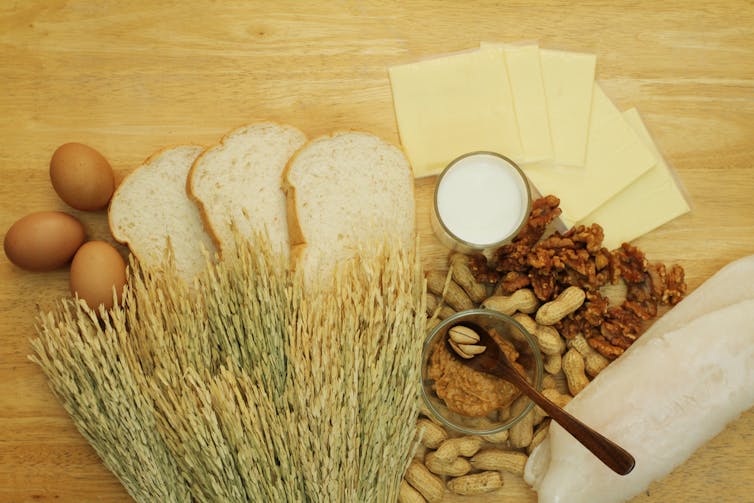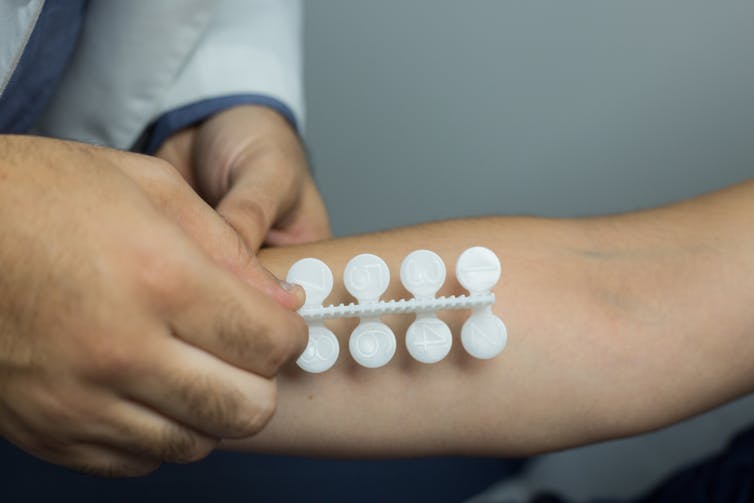
Matthew Ridd, University of Bristol and Robert Boyle, Imperial College London
Around one in five children have eczema – and even mild cases can have a big impact on both the child and their family. For many, symptoms will come and go before they start primary school, but for others it can indicate the beginning of a genetic tendency to develop allergic conditions such as hay fever or asthma (or both).
We also know that children with eczema are more likely to develop food allergies, especially if the condition starts in the first few months of life and is severe. Often parents will make the allergy diagnosis themselves – at the sudden onset of vomiting, diarrhoea or rash after eating scrambled egg, for example.
This can be frightening, but doctors can usually easily confirm the cause of these immediate reactions by talking to the parents and offering a confirmatory allergy blood or skin prick test.
In the absence of such obvious physical reactions however, a different question sometimes arises for parents: “Is a food allergy contributing to my child’s eczema and would an allergy test help to find out?”
GPs diagnose and treat most children with eczema – and parents often ask this question, worried that something in the child’s diet (or the diet of a breast-feeding mother) is contributing to their dry, itchy and inflamed skin. But it can be difficult to link any given food to a worsening of eczema, as symptoms may not appear for hours or even days after eating it.
On top of this, the value of allergy tests in these circumstances is uncertain since we don’t really know how commonly food allergy worsens eczema symptoms. Although eczema and food allergy often occur together, food allergy is not thought to be the main cause of eczema. In fact, many experts believe that it is eczema which leads to the development of allergy to foods.
A second uncertainty about the value of allergy tests in children with eczema is that a child with a positive test may be “sensitised” rather than “allergic” to any given food. This means they can actually eat that food without any apparent ill effect. So testing could potentially lead to unnecessary and unhelpful dietary restriction.
For children with early onset, difficult to treat eczema, guidelines steer GPs in the UK towards referral for food allergy tests or special diets in case exposure to food allergens might be worsening the eczema. However, for older children or those with milder forms of eczema, it’s not so straightforward.
Sometimes parents don’t raise their concerns at all, or if they do, they may feel their concerns are being dismissed. Even when parents and doctors agree that further investigation is needed, access to specialist advice on the NHS is not guaranteed. Most allergy services in the UK have waiting lists of several months and don’t have the capacity to see every child with eczema.
So, what happens? As we confirmed in a recent online survey, many parents of children with eczema take matters into their own hands. They may exclude foods such as dairy, wheat or eggs without any professional advice. This is not without its own risks as a restricted diet may lead to malnutrition.

Shutterstock
Although eczema is most commonly linked with allergy to eggs or peanuts, parents often restrict dairy or wheat because these are eaten more regularly. Some doctors advise allergy testing to look for food allergies which might be worsening the eczema. Others think that allergy tests are more likely to cause harm through unnecessary dietary restrictions than to help the eczema.
Seeking solutions
To try to unpick the problem a bit more, we’ve just finished recruiting children with eczema to a trial exploring the role of routine allergy history and skin prick testing in the dietary management of eczema.
Funded by the NIHR School for Primary Care Research, 84 children in the English city of Bristol, have been randomised to receive either usual care or an intervention of “test-guided dietary advice”. At the end of the study we expect to have a better understanding of both the feasibility of doing future bigger studies and also the issues from the perspective of both parents and GPs.
In addition, the NIHR recently funded an allergy working group to try to improve the capacity for primary care research in the important but neglected area of allergies more generally.
So what should parents and clinicians do until more research is available to guide them over whether certain foods may be making children’s eczema worse?
At the moment there is no cure for eczema. So the best advice is to use two simple treatments (emollients and topical corticosteroids) to control the disease. However, if there are any immediate reactions to food or, despite good skin care, the child’s skin is causing misery, parents should persist in seeking further help from their family doctor.![]()
Matthew Ridd, GP and Senior Lecturer in Primary Healthcare, University of Bristol and Robert Boyle, Reader in Paediatric Allergy, Imperial College London
This article is republished from The Conversation under a Creative Commons license. Read the original article.
